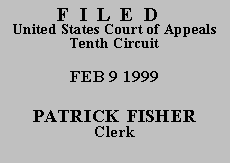

| ROBERT LESLIE RICE, |
|
Before BRORBY, EBEL, and
LUCERO, Circuit Judges.
After examining the briefs and appellate record, this panel has determined
unanimously that oral argument would not materially assist the determination of
this appeal. See Fed. R. App. P. 34(a)(2); 10th Cir. R. 34.1.9(G). The case is
therefore ordered submitted without oral argument.
Appellant Robert Leslie Rice, a pro se state inmate, appeals the district court's order dismissing his 42 U.S.C. § 1983 complaint against various Colorado state officials in connection with an extradition warrant. The district court summarily dismissed the complaint as frivolous under 28 U.S.C. § 1915(e)(2)(B)(i). We affirm.
Following a conviction for burglary, Mr. Rice violated the conditions of his parole by leaving California and returning to Colorado. Consequently, on February 1, 1996, the State of Colorado brought a charge of fugitive from justice against him, in addition to other felony charges. On April 4, 1996, the trial court granted a motion to dismiss the fugitive from justice case without prejudice, but Mr. Rice remained incarcerated on the felony charges. He pled guilty to those charges on June 9, 1996, with his sentencing hearing scheduled for September 3, 1996. Prior to entry of his guilty plea, the Governor of Colorado issued an extradition warrant against Mr. Rice on request from the State of California. The terms of the extradition warrant placed a "hold" on Mr. Rice in the event he posted bond for release.
In July 1996, Mr. Rice allegedly attempted to make arrangements with a bondsman for his release, but learned of the "hold" placed on him for extradition to California. Months later, California state officials discharged the parole violator warrant against Mr. Rice, effective November 1, 1996, but did not notify Colorado state officials of the request to cancel the extradition detainer until December 16, 1996.
In his complaint, Mr. Rice claims various state officials, including the governor, stepped outside their official duties by entering into a conspiracy to violate his constitutional rights. Specifically, Mr. Rice claims these officials violated the "fundamental fairness" principle of due process by holding him after dismissal of his fugitive from justice case in April 1996.
After liberally construing Mr. Rice's pro se complaint, the district court dismissed it sua sponte as legally frivolous under 28 U.S.C. §1915(e)(2)(B)(i). The district court determined Colorado officials did not receive notification of California's discharge of the parole violator warrant against Mr. Rice until December 16, 1996. Therefore, it concluded the Colorado officials did not have authority from California to removal the extradition hold on Mr. Rice until that time. In dismissing Mr. Rice's complaint, the district court found his violation of due process claim vague and conclusory.
In his appeal, Mr. Rice asserts the district court erred in dismissing his complaint as "vague and conclusionary [sic]." He submits that the named officials "stepped outside the duties of their offices in entering into a conspiracy" against him so they "do not have judicial immunity." He further contends the district court's dismissal of his complaint violates his First Amendment right to access the courts.
We review for abuse of discretion the district court's § 1915(e) dismissal of a complaint as frivolous. McWilliams v. State of Colorado, 121 F.3d 573, 574-75 (10th Cir. 1997) (citing Schlicher v. Thomas, 111 F.3d 777, 779 (10th Cir. 1997)). A complaint "'is frivolous where it lacks an arguable basis either in fact or law.'" Green v. Seymour, 59 F.3d 1073, 1077 (10th Cir. 1995) (quoting Neitzke v. Williams, 490 U.S. 319, 325 (1989)). In applying these standards, we liberally construe a pro se litigant's complaint. See Haines v. Kerner, 404 U.S. 519, 520-21 (1972).
We have reviewed the record and considered Mr. Rice's arguments. We conclude the district court did not abuse its discretion in dismissing Mr. Rice's pro se complaint as legally frivolous. We therefore affirm the district court's dismissal for substantially the same reasons stated in its July 28, 1998 Order and attach a copy hereto.
Similarly, we find legally frivolous Mr. Rice's new assertion that the district court's dismissal of his complaint somehow violates his constitutional right to access the courts. While the right to access the courts may extend to 42 U.S.C. § 1983 actions, such a claim must show some actual denial of an opportunity to come before the court. Cf. Lewis v. Casey, 518 U.S. 343, 351, 354-55 (1996). It appears Mr. Rice fully exercised his right to present his complaint to the district court, and he fails to allege prison officials in any way denied him a reasonably adequate opportunity to present it. Id. at 351. Moreover, a constitutional violation of the right to access the courts does not result simply because a district court dismisses a frivolous complaint.
We deny Mr. Rice's request for documents. The judgment of the district court dismissing the complaint as legally frivolous under 28 U.S.C. § 1915(e)(2)(B)(i) is AFFIRMED. We conclude this appeal counts as a prior occasion for the purposes of § 1915(g). Because a complaint dismissed under § 1915(e)(2)(B)(i) and affirmed on appeal counts as two prior occasions for purposes of § 1915(g), two "strikes" are recorded against Mr. Rice. The mandate shall issue forthwith.
Entered by the Court:
WADE BRORBY
United States Circuit Judge
*. This order and judgment is not binding precedent except under the doctrines of law of the case, res judicata and collateral estoppel. The court generally disfavors the citation of orders and judgments; nevertheless, an order and judgment may be cited under the terms and conditions of 10th Cir. R. 36.3.